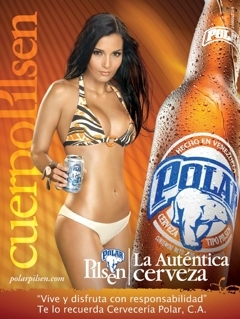President Chavez threatens to nationalise Polar
Since 2003, the Chavez government has imposed price controls on many foodstuffs. The results have been persistent shortages and soaring inflation in a country of 27 million people: the price of food and drink rose by 21 percent alone in the first five months of 2010, reports The Economist.
Nevertheless, the government is stepping up expropriations of farms, food manufacturers and distributors, in a bid to achieve what it calls “state hegemony” over the food supply. On 7 June 2010 it announced the takeover of 18 more food companies accused of violating regulations, media sources say.
Already some 70 percent of Venezuela’s food is imported, which generates ample opportunities for graft. Most of the farms and food companies the president has expropriated suffer from inflated payrolls, declining productivity and rampant inefficiency. With so much of the economy now in state hands, several businessmen have called on the government to take responsibility for Venezuela’s economic decline and stop blaming the private sector.
The country’s economy contracted 5.8 percent in the first quarter of this year compared with a year earlier.
The International Monetary Fund predicts that Venezuela’s GDP will shrink by 2.6 percent in 2010, making it the only Latin American economy, and the world’s only oil exporter, to see a contraction for this year.
Everybody is now watching very closely how Empresas Polar will fare, a family-owned giant that is Venezuela’s biggest private food-and-drink company. Harina PAN maize flour, Chiffon margarine, Efe ice creams and Toddy chocolate milk are just some of the brands produced by Mr Mendoza’s conglomerate. Polar also has the distribution rights for Pepsi-Cola products in Venezuela.
Polar, which claims to generate almost 3 percent of the country’s non-oil GDP and has 19,000 employees, has frequently complained of harassment. The Economist reports that Polar’s plants and offices were visited 220 times by government inspectors in the first five months of this year. In late May, the government confiscated 114 tonnes of food from a Polar warehouse, alleging hoarding (which the company denies).
Interestingly, Mr Chavez’ threats against Polar are rejected by its well-paid and loyal workforce. But what are some 19,000 Polar workers compared with Mr Chavez’ 7.3 million voters, a fair share of whom are also unionised, who secured his re-election in 2006?
Mr Chavez and his loyal followers view Polar as one of the biggest remaining obstacles to the installation of Cuban-style communism in Venezuela.
Venezuela’s beer drinkers, who knocked back a staggering 100 litres per capita in 2008, are doubtless hoping that a nationalised Polar would not lead to a shortage of their favourite national beverage. The plants do not have enough locally-grown raw material to operate at full capacity, so imports are still necessary.
In fact, menacing Polar with nationalization is not without its risks. Should a nationalized Polar fail to supply the market, it might lose Mr Chavez the legislative election scheduled for September 2010. As Venezuelans say “love, with hunger, doesn’t last.”

